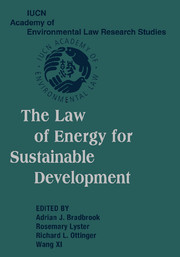Book contents
- Frontmatter
- Contents
- Acknowledgments
- Message from Kofi A. Annan, Secretary-General, United Nations
- Introduction – A Global Learned Society to Address Earth's Evolution: The IUCN Academy of Environmental Law
- Public Lectures on International Environmental Law
- PART ONE SUSTAINABLE DEVELOPMENT AND THE ROLE OF ENERGY LAW
- PART TWO LEGAL ISSUES IN CONTEMPORARY ENERGY LAW
- PART THREE INTERNATIONAL ENERGY LAW
- 11 International Law and Global Sustainable Energy Production and Consumption
- 12 Policy Options
- 13 Financing Energy for Sustainable Development
- 14 The Clean Development Mechanism and UNFCCC / Kyoto Protocol Developments
- 15 The Report of the World Commission on Dams: Some Implications for Energy Law
- 16 International Issues for Sustainable Development: IUCN Perspective
- 17 Enhanced Implementation and Enforcement of International Environmental Laws by the Judiciary
- PART FOUR COMPARATIVE ENERGY LAW
- PART FIVE ELECTRICITY RESTRUCTURING
- PART SIX FINANCING FOR SUSTAINABLE ENERGY
- PART SEVEN CIVIL SOCIETY AND THE PROCEDURAL REQUIREMENTS OF ENERGY LAW FOR SUSTAINABLE DEVELOPMENT
- Index
11 - International Law and Global Sustainable Energy Production and Consumption
Published online by Cambridge University Press: 10 August 2009
- Frontmatter
- Contents
- Acknowledgments
- Message from Kofi A. Annan, Secretary-General, United Nations
- Introduction – A Global Learned Society to Address Earth's Evolution: The IUCN Academy of Environmental Law
- Public Lectures on International Environmental Law
- PART ONE SUSTAINABLE DEVELOPMENT AND THE ROLE OF ENERGY LAW
- PART TWO LEGAL ISSUES IN CONTEMPORARY ENERGY LAW
- PART THREE INTERNATIONAL ENERGY LAW
- 11 International Law and Global Sustainable Energy Production and Consumption
- 12 Policy Options
- 13 Financing Energy for Sustainable Development
- 14 The Clean Development Mechanism and UNFCCC / Kyoto Protocol Developments
- 15 The Report of the World Commission on Dams: Some Implications for Energy Law
- 16 International Issues for Sustainable Development: IUCN Perspective
- 17 Enhanced Implementation and Enforcement of International Environmental Laws by the Judiciary
- PART FOUR COMPARATIVE ENERGY LAW
- PART FIVE ELECTRICITY RESTRUCTURING
- PART SIX FINANCING FOR SUSTAINABLE ENERGY
- PART SEVEN CIVIL SOCIETY AND THE PROCEDURAL REQUIREMENTS OF ENERGY LAW FOR SUSTAINABLE DEVELOPMENT
- Index
Summary
INTRODUCTION
Over the past fifty years, the intergovernmental consultation process under the umbrella and the framework of the United Nations, its General Assembly, and its various subsidiary organs and commissions has produced a large number of international conventions and protocols under which nations have committed themselves to agreed principles of international law and global standards. While conventions and protocols form the core of binding international law, the world community has always recognized the value of achieving consensus in the formulation of nonbinding principles and universal policy guidelines through which policy issues of international concern can be addressed.
Growing recognition of the need to achieve an ecologically more sustainable socioeconomic development has clearly marked the international development debate throughout the past decade. In the same context, the need to urgently address energy–environment related issues and to work toward a sustainable energy future for all humankind has been widely recognized. In spite of the increased global concerns for greater environmental protection and greater integration of environmental concerns into energy sector and economic decision making, and in spite of a considerable potential for international consensus on global policy guidelines in this field, no universal “code of conduct,” “guideline,” “action plan,” or other form of “soft law” has yet been established.
This chapter seeks to remedy this omission and propose draft guidelines on sustainable energy production and consumption applicable to both developed and developing countries.
- Type
- Chapter
- Information
- The Law of Energy for Sustainable Development , pp. 181 - 201Publisher: Cambridge University PressPrint publication year: 2005
- 2
- Cited by



